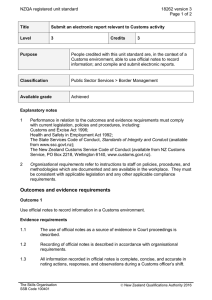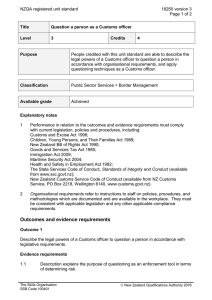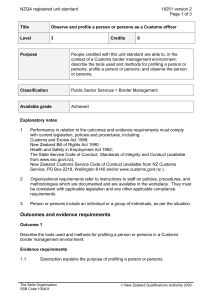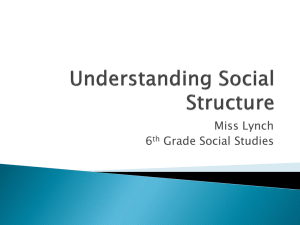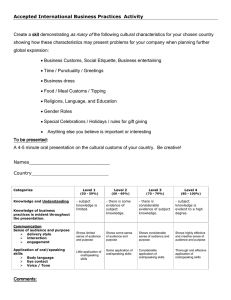NZQA registered unit standard 19645 version 2 Page 1 of 3
advertisement
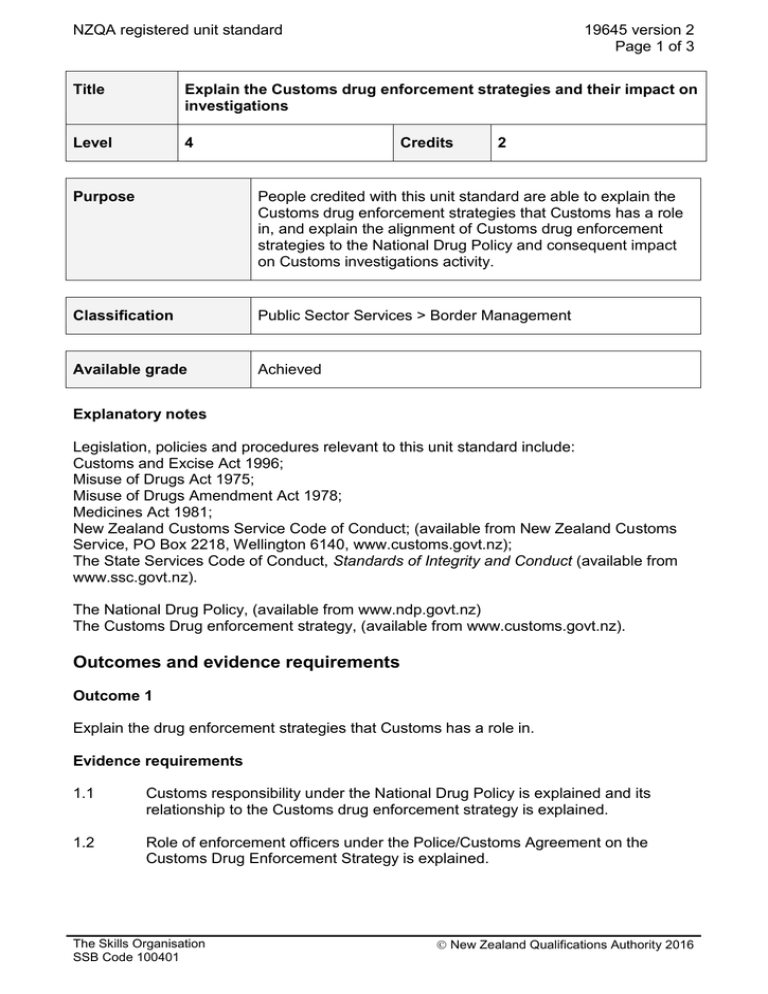
NZQA registered unit standard 19645 version 2 Page 1 of 3 Title Explain the Customs drug enforcement strategies and their impact on investigations Level 4 Credits 2 Purpose People credited with this unit standard are able to explain the Customs drug enforcement strategies that Customs has a role in, and explain the alignment of Customs drug enforcement strategies to the National Drug Policy and consequent impact on Customs investigations activity. Classification Public Sector Services > Border Management Available grade Achieved Explanatory notes Legislation, policies and procedures relevant to this unit standard include: Customs and Excise Act 1996; Misuse of Drugs Act 1975; Misuse of Drugs Amendment Act 1978; Medicines Act 1981; New Zealand Customs Service Code of Conduct; (available from New Zealand Customs Service, PO Box 2218, Wellington 6140, www.customs.govt.nz); The State Services Code of Conduct, Standards of Integrity and Conduct (available from www.ssc.govt.nz). The National Drug Policy, (available from www.ndp.govt.nz) The Customs Drug enforcement strategy, (available from www.customs.govt.nz). Outcomes and evidence requirements Outcome 1 Explain the drug enforcement strategies that Customs has a role in. Evidence requirements 1.1 Customs responsibility under the National Drug Policy is explained and its relationship to the Customs drug enforcement strategy is explained. 1.2 Role of enforcement officers under the Police/Customs Agreement on the Customs Drug Enforcement Strategy is explained. The Skills Organisation SSB Code 100401 New Zealand Qualifications Authority 2016 NZQA registered unit standard 19645 version 2 Page 2 of 3 Outcome 2 Explain the alignment of the Customs Drug Enforcement Strategy to the National Drug Policy and consequent impact on Customs investigations activity. Evidence requirements 2.1 The role of the Customs Drug Enforcement Strategy in reducing the drug supply contributing to human harm is explained in terms of the National Drug Policy. 2.2 Customs priorities are explained in terms of the Customs Drug Enforcement Strategy and the National Drug Policy. 2.3 The role of the National Drug Intelligence Bureau is explained evidencing the co-operative relationships between Police and Customs in drug enforcement. Range 2.4 includes but is not limited to – profile of national drug scene, international enquiries, co-ordination of requests to overseas posts. The contribution by Customs to the function of the National Drug Intelligence Bureau is explained. Status and review information Registration date 16 July 2010 Date version published 16 July 2010 Planned review date 1 February 2015 Accreditation and Moderation Action Plan (AMAP) reference 0121 This AMAP can be accessed at http://www.nzqa.govt.nz/framework/search/index.do. Please note Providers must be granted consent to assess against standards (accredited) by NZQA, or an inter-institutional body with delegated authority for quality assurance, before they can report credits from assessment against unit standards or deliver courses of study leading to that assessment. Industry Training Organisations must be granted consent to assess against standards by NZQA before they can register credits from assessment against unit standards. Providers and Industry Training Organisations, which have been granted consent and which are assessing against unit standards must engage with the moderation system that applies to those standards. The Skills Organisation SSB Code 100401 New Zealand Qualifications Authority 2016 NZQA registered unit standard 19645 version 2 Page 3 of 3 Consent requirements and an outline of the moderation system that applies to this standard are outlined in the Accreditation and Moderation Action Plan (AMAP). The AMAP also includes useful information about special requirements for organisations wishing to develop education and training programmes, such as minimum qualifications for tutors and assessors, and special resource requirements. Comments on this unit standard Please contact The Skills Organisation info@skills.org.nz if you wish to suggest changes to the content of this unit standard. The Skills Organisation SSB Code 100401 New Zealand Qualifications Authority 2016
